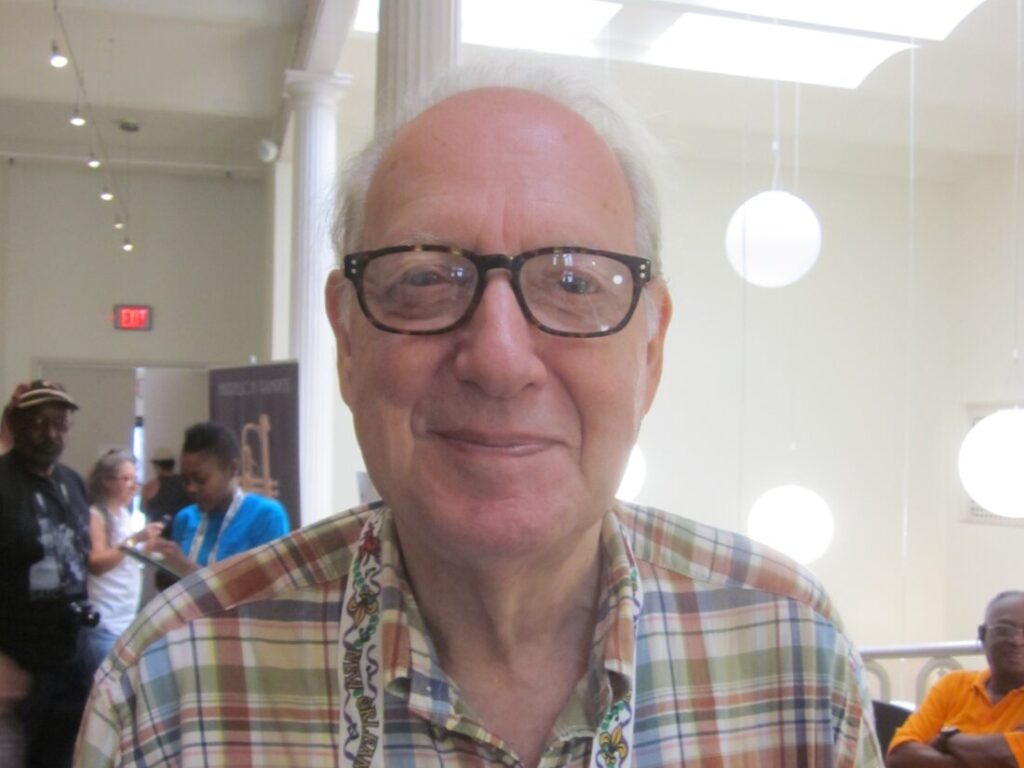Dan Morgenstern is pictured at Satchmo Summerfest in New Orleans in 2012.
Infrogmation of New Orleans/Flickr Creative Commons
hide caption
toggle caption
Infrogmation of New Orleans/Flickr Creative Commons
Jazz critic and historian Dan Morgenstern has died at age 94.
Over the course of seven decades, Morgenstern helmed major jazz magazines, wrote two books, produced concerts, won multiple Grammys, taught college and oversaw one of the largest jazz archives in the world.
“He died peacefully yesterday (Saturday) afternoon, with his family by his side. He was 94 and died of heart failure,” said his son Josh Morgenstern.
Morgenstern began his career right out of college, working as a jazz critic at the New York Post. In the 1960s, he edited the two most influential jazz magazines of the day, Metronome and Downbeat. In 1973, he won the first of his eight Grammy Awards for his liner notes to an anthology of Art Tatum recordings.
“He would hear things — subtleties — that will always be beyond me. He was not a musician, but his ear was so great. And his ability to share that knowledge with people was just unparalleled,” said Tad Hershorn, a jazz journalist and archivist at the Rutgers Institute of Jazz studies, one of the world’s largest collections of jazz documents and recordings.
Dan Morgenstern became director of the Institute in 1976 and held the post for more than three decades.
Hershorn says Morgenstern’s perspective was unique.
“He was there. When you think about mythic things. When Bud Powell returned from France in 1964 — Dan was there to meet him at the airport. You want to ask about Billie Holiday’s funeral? These are people who meant so much to him.”
Hershorn says that affinity had a lot to do with Morgenstern’s background. He was born in Munich in 1929, to Jewish parents who had to flee from the Nazis. He and his mother made it to Denmark and later Sweden. The family would later reunite in New York City.
By the time Morgenstern got to the U.S. in 1947, he’d already heard Ella Fitzgerald, Louis Armstrong and Duke Ellington on his mother’s phonograph.
“Most people, when they come to New York for the first time, they want to see the Empire State Building, but I wanted to see 52nd Street,” the hotbed of the jazz scene, he said in a 2007 interview for the Smithsonian Oral History Project.
“The clubs were smaller and a little funkier than I imagined, but as I found out, that was part of its charm. There was so much going on all the time,” he told JerryJazzMusician.com in 2005.
Morgenstern organized a concert for Art Tatum when he attended Brandeis University on the GI Bill, which he later described as a turning point on his path to becoming a jazz critic — a term he was uneasy about.
“I’ve been called a critic, but never really liked that term; I much prefer advocate,” he told the National Endowment for the Arts. “It’s a blessing to have been able to make a living and a life involved with something one loves, and the music has never lost its magic; I first got involved as a fan and I still am, of the music, of the wonderful artists who create it, (and so many of whom I’ve been lucky to get to know), and of the precious legacy that I’ve been privileged to help collect, preserve, and share. Jazz brings people together; it’s America’s gift to the world.”
NPR’s James Doubek contributed to this story.


